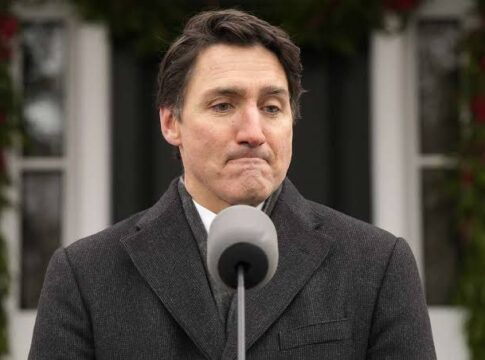Canadian Prime Minister Justin Trudeau has announced his intention to step down as leader of the Liberal Party. His decision follows months of internal dissent, declining poll numbers, and rising pressure from political adversaries.
Trudeau, 53, will remain in office until a successor is chosen. Addressing Canadians from Rideau Cottage, he reflected on his tenure. “Every day as Prime Minister, I’ve been inspired by Canadians’ resilience and determination,” he said. “But it’s clear that if I must fight internal battles, I cannot lead effectively into the next election.”
Legacy of Leadership: Trudeau’s Achievements and Challenges
Trudeau first swept to power in 2015, steering the Liberal Party to two additional victories in 2019 and 2021. Under his leadership, Canada saw significant reforms, including the legalization of cannabis, the implementation of a carbon tax to combat climate change, and an overhaul of Senate appointments to promote transparency.
READ MORE: Nigeria’s Refineries to Consume 37% of Local Oil in Early 2025
Reflecting on his achievements, Trudeau noted, “We fought for the middle class, reduced taxes, and built an economy focused on everyone—not just the privileged few.”
Despite these successes, his government faced mounting criticism in recent months. A series of no-confidence votes, disagreements with key allies, and tensions with U.S. President-elect Donald Trump have taken a toll. Deputy Prime Minister Chrystia Freeland’s December resignation marked a turning point. Freeland cited irreconcilable differences with Trudeau over handling Trump’s proposed 25% tariff on Canadian goods.
What’s Next for Canada and the Liberal Party?
The Liberal Party now faces a pivotal moment as it prepares to select a new leader ahead of the next federal election, slated for October. Polls suggest the party risks defeat to the opposition Conservatives if Trudeau remains at the helm.
Potential candidates include Chrystia Freeland, former finance minister and a strong contender in recent polls, and Mark Carney, an economist and former Bank of Canada governor. “Canada deserves a real choice in the next election,” Trudeau emphasized. “It’s time for fresh leadership to unite our party and country.”
Trump’s Shadow Over Canadian Politics
Adding to Trudeau’s challenges is U.S. President-elect Donald Trump’s aggressive trade stance. Trump has threatened sweeping tariffs on Canadian goods, describing Canada’s economic policies as “unfair.” His comments, alongside public endorsements for a U.S.-Canada merger, have sparked widespread debate.
Billionaire Elon Musk joined the controversy, hailing Trudeau’s resignation as a positive sign for 2025. Meanwhile, Trump’s repeated jabs at Trudeau, including labeling him Canada’s “governor,” further strained relations.




